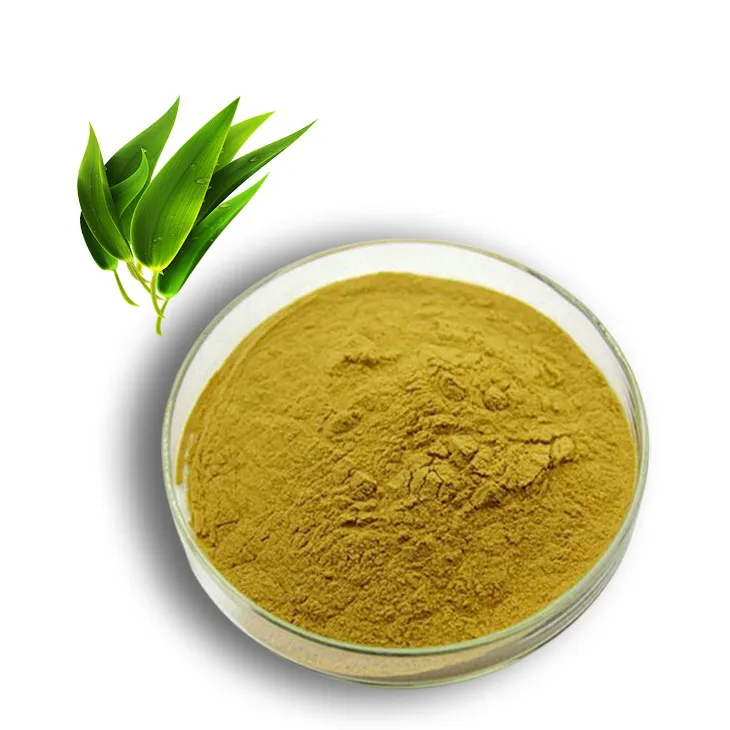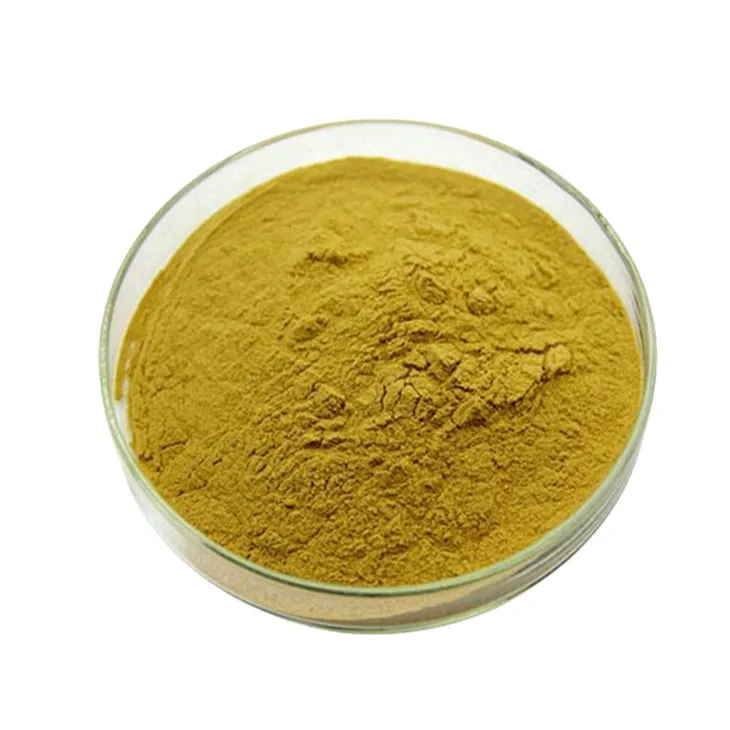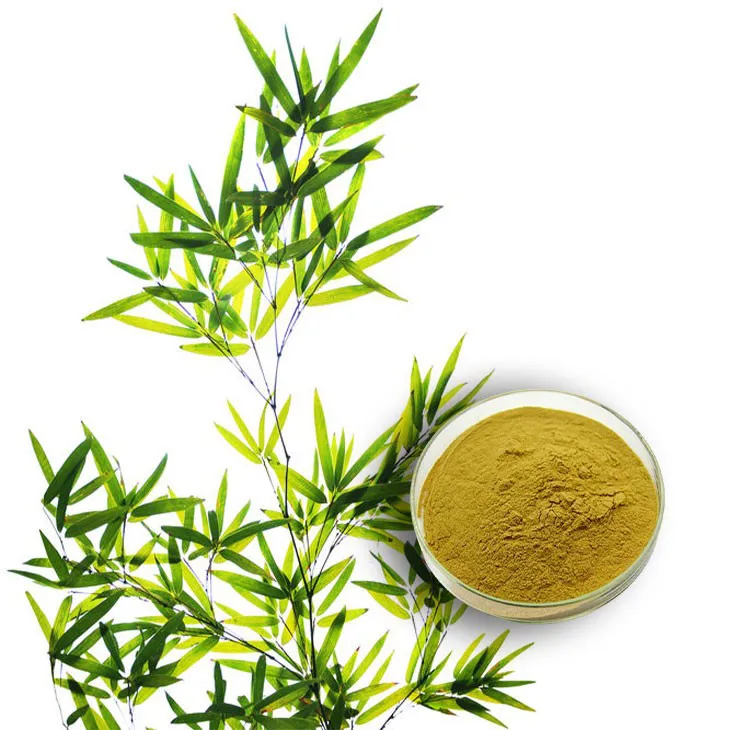- 0086-571-85302990
- sales@greenskybio.com
Active components in bamboo leaf extracts.
2024-11-27

Introduction
Bamboo, a common plant in many parts of the world, has long been used in traditional medicine. Bamboo Leaf extracts are rich in various active components, which have attracted significant attention in recent years. These components possess a wide range of biological activities and potential health benefits. In this article, we will explore the main active components in Bamboo Leaf extracts in detail.

Alkaloids in Bamboo Leaf extracts
1. General Characteristics of Alkaloids
Alkaloids are a class of nitrogen - containing organic compounds that are typically alkaline in nature. In bamboo leaves, alkaloids are among the important active components. They are synthesized through complex biochemical pathways within the plant cells.
2. Antibacterial Effects
One of the remarkable properties of alkaloids in bamboo leaves is their antibacterial potential.
- Studies have shown that certain alkaloids can inhibit the growth of various bacteria. For example, they may disrupt the cell walls or interfere with the metabolic processes of bacteria such as Escherichia coli and Staphylococcus aureus.
- The antibacterial activity of these alkaloids can be attributed to their chemical structures. Some alkaloids contain functional groups that can interact with specific components on the bacterial cell surface or within the cell, leading to cell death or inhibition of growth.
3. Antiviral Effects
In addition to antibacterial effects, alkaloids in bamboo leaves may also possess antiviral properties.
- They can potentially interfere with the replication cycle of viruses. For instance, some alkaloids may bind to viral proteins or nucleic acids, preventing the virus from multiplying within the host cells.
- Research on specific viruses, such as influenza viruses, has shown that bamboo leaf alkaloids could be a potential source for the development of antiviral agents. However, more in - depth research is still needed to fully understand their mechanisms of action and efficacy.

Sterols in Bamboo Leaf Extracts
1. Types and Occurrence of Sterols
Sterols are another important class of active components in bamboo leaf extracts. There are different types of sterols present in bamboo leaves.
- These sterols are structurally similar to cholesterol in animals, but they have different physiological functions. They are synthesized in the plant and play important roles in the plant's own physiological processes as well as potentially having effects on human health when consumed.
2. Role in Lipid Metabolism
One of the significant functions of sterols in bamboo leaf extracts is their potential influence on lipid metabolism.
- They may interact with the body's lipid - related enzymes or receptors. For example, some sterols can inhibit the absorption of dietary cholesterol in the intestine, thereby helping to reduce blood cholesterol levels.
- Studies have also suggested that sterols in bamboo leaf extracts could regulate the synthesis and transport of lipids within the body, which may be beneficial for preventing lipid - related disorders such as hyperlipidemia.

Volatile Oils in Bamboo Leaf Extracts
1. Composition and Fragrance
Volatile oils are an important part of bamboo leaf extracts. They are composed of a variety of volatile organic compounds.
- The unique combination of these compounds gives bamboo leaf extracts their characteristic fragrance. This fragrance can be described as fresh, green, and somewhat earthy, which is highly appealing.
- The composition of volatile oils may vary depending on factors such as the species of bamboo, the growth environment, and the extraction method. However, some common compounds in bamboo leaf volatile oils include terpenes and their derivatives.
2. Pharmacological Effects
Besides their pleasant fragrance, volatile oils in bamboo leaf extracts may also have certain pharmacological effects.
- One of the potential effects is relaxation of the body and mind. The volatile oils may act on the nervous system, either by directly interacting with nerve receptors or by influencing neurotransmitter release. For example, they may have a mild sedative effect, helping to reduce stress and anxiety.
- Some research also suggests that these volatile oils may have anti - inflammatory properties. They could potentially inhibit the production of inflammatory mediators in the body, which may be useful in treating inflammatory conditions.

Other Active Components and Potential Applications
1. Flavonoids
Flavonoids are also present in bamboo leaf extracts.
- They are known for their antioxidant properties. Flavonoids can scavenge free radicals in the body, which are highly reactive molecules that can cause damage to cells and tissues. By neutralizing these free radicals, flavonoids may help prevent oxidative stress - related diseases such as cancer, cardiovascular diseases, and neurodegenerative disorders.
- Some flavonoids in bamboo leaf extracts may also have anti - allergic effects. They can modulate the immune response in the body, particularly in relation to allergic reactions, by suppressing the release of histamine and other allergic mediators.
2. Potential Applications in Cosmetics
The active components in bamboo leaf extracts have potential applications in the cosmetics industry.
- The antioxidant and anti - inflammatory properties of components such as flavonoids and volatile oils make them suitable for use in skin - care products. They can help protect the skin from environmental damage, reduce inflammation, and improve skin complexion.
- The unique fragrance of volatile oils can also be used in perfumes and body care products, providing a natural and refreshing scent.
3. Potential Applications in Food and Beverages
Bamboo leaf extracts can also be used in the food and beverage industry.
- The antibacterial and antiviral properties of alkaloids can potentially be used for food preservation. They can help inhibit the growth of harmful microorganisms in food, extending the shelf life of food products.
- The presence of sterols and flavonoids with potential health - promoting effects may also make bamboo leaf extracts suitable for use in functional foods and beverages. For example, they could be added to drinks to provide additional health benefits such as improving lipid metabolism or antioxidant protection.
Conclusion
In conclusion, bamboo leaf extracts contain a variety of active components such as alkaloids, sterols, volatile oils, and flavonoids. These components possess diverse biological activities including antibacterial, antiviral, lipid - metabolism - regulating, relaxation, antioxidant, and anti - allergic effects. Their potential applications in cosmetics, food, and beverages industries are also significant. However, more research is still needed to fully understand the mechanisms of action of these components, optimize extraction methods, and ensure their safety and efficacy for various applications. With further research, bamboo leaf extracts may become an important source of natural products with wide - ranging health and commercial benefits.
FAQ:
What are the main active components in bamboo leaf extract?
The main active components in bamboo leaf extract include alkaloids, sterols, and volatile oils.
What are the potential bioactivities of alkaloids in bamboo leaf extract?
Alkaloids in bamboo leaf extract may have potential bioactivities such as antibacterial and antiviral effects, which can be helpful for preventing and treating infections.
How do sterols in bamboo leaf extract function?
Sterols in bamboo leaf extract are involved in regulating certain physiological functions in the body, for example, they may have an impact on lipid metabolism.
What are the characteristics of volatile oils in bamboo leaf extract?
Volatile oils in bamboo leaf extract can give off a unique fragrance and may also have certain pharmacological effects like relaxing the body and mind.
Are there other potential functions of the active components in bamboo leaf extract?
There may be other potential functions. However, more research is needed to fully explore and understand all the functions of these active components.
Related literature
- Bioactive Compounds in Bamboo Leaves: Extraction, Identification and Biological Activities"
- "The Chemical Composition and Pharmacological Effects of Bamboo Leaf Extract"
- ▶ Hesperidin
- ▶ citrus bioflavonoids
- ▶ plant extract
- ▶ lycopene
- ▶ Diosmin
- ▶ Grape seed extract
- ▶ Sea buckthorn Juice Powder
- ▶ Beetroot powder
- ▶ Hops Extract
- ▶ Artichoke Extract
- ▶ Reishi mushroom extract
- ▶ Astaxanthin
- ▶ Green Tea Extract
- ▶ Curcumin Extract
- ▶ Horse Chestnut Extract
- ▶ Other Problems
- ▶ Boswellia Serrata Extract
- ▶ Resveratrol Extract
- ▶ Marigold Extract
- ▶ Grape Leaf Extract
- ▶ blog3
- ▶ blog4
-
Organic Hawthorn Powder Suppliers.
2024-11-27
-
Organic cocoa extract of trace components.
2024-11-27
-
The best - quality vitamin K2.
2024-11-27
-
Citrus bioflavonoids
2024-11-27
-
Scutellaria Extract
2024-11-27
-
Green Tea Extract
2024-11-27
-
Horse Chestnut Extract
2024-11-27
-
Polygonum Cuspidatum Extract
2024-11-27
-
Mulberry Extract
2024-11-27
-
Angelica sinensis extract
2024-11-27
-
Yellow Pine Extract
2024-11-27
-
Propolis Extract Powder
2024-11-27
-
Clove Powder
2024-11-27





















